

Early Literacy. 5 Film and Series quotes that help us become better teachers. Most of us cannot watch a film or an episode of our favourite series without trying to identify scenes that could be used in our lessons, right?
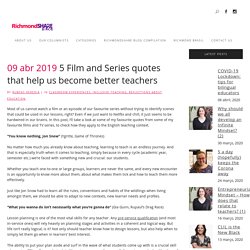
Even if we just want to Netflix and chill, it just seems to be hardwired in our brains. In this post, I’ll take a look at some of my favourite quotes from some of my favourite films and TV series, to check how they apply to the English teaching context. “You know nothing, Jon Snow” (Ygritte, Game of Thrones) No matter how much you already know about teaching, learning to teach is an endless journey. 'Empathy is a quality of character that can change the world' Useful comments and conversations. Further reading. Pre-birth to Three: Observation, Assessment and Planning. This ‘Kindness Curriculum’ Is Free And Should Be Used In Every Classroom. 21 Of The Best Early Years Books For International Friendship Day.
We know that skills like empathy aren’t fully developed until later in a child’s life, which is why there are so many stories on friendship and how to treat people aimed at Early Years. International Friendship Day, then, is a great opportunity to share some of these amazing books with your children. It does, however, fall on Sunday 30 July. So celebrating on the day itself is going to be difficult, doubly so for Reception classes who are on summer holidays. Here are our picks for some top tales that touch on various aspects of friendship that kids will love. 1 | Bubble Trouble Tom Percival (Bloomsbury, paperback, £6.99) Reuben and Felix are best friends, whose favourite thing in the world to do is to blow bubbles. Review: Bubble Trouble. 2 | Little Puppy Lost Holly Webb (Little Tiger Press, paperback, £6.99) Review: Little Puppy Lost. 3 | The Super Swooper Dinosaur Marin Waddell (Orchard Books, hardback, £11.99) Review: The Super Swooper Dinosaur.
Don't Expect Toddlers To Behave Consistently — They Literally Can't. A 19-Year Study Reveals Kindergarten Students With These 2 Skills Are Twice as Likely to Obtain a College Degree (And They Have Nothing to Do With Reading) One theory all teachers with disruptive children should know about. Imagine a classroom where children are unable to wait their turn or stay focused on their work.
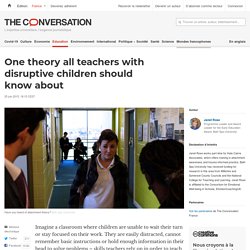
They are easily distracted, cannot remember basic instructions or hold enough information in their head to solve problems – skills teachers rely on in order to teach successfully. These behavioural issues are all examples of problems that can arise from attachment issues – based on the relationship between children and their main caregiver. Attachment theory is now one of the world’s most well-researched theories about human development. Can Free Play Prevent Depression and Anxiety In Kids? Public Media for Northern CA.
Public Media for Northern CA. How Are Happiness and Learning Connected? As teachers, we also know that when students' affective filters or defenses are sky high, fight or flight responses will be modus operandi. A room full of defensive behaviors (withdrawn, angry) is a sad, unproductive place to teach and learn. Now let's flip it and take a look at how much more we are able to learn when we are in harmony with the people and things in any given educational environment. Being in harmony means feeling safe, feeling valued and a necessary part a group, and in this case, a learning community.
Key Person & Attachment - Early Years Matters. The Key Person Children thrive from a base of loving and secure relationships. This is normally provided by a child’s parents but it can also be provided by a key person. A key person is a named member of staff with responsibilities for a small group of children who helps those children in the group feel safe and cared for. The role is an important one and an approach set out in the EYFS which is working successfully in settings and in Reception classes. It involves the key person in responding sensitively to children’s feelings and behaviours and meeting emotional needs by giving reassurance, such as when they are new to a setting or class, and supporting the child’s well-being.
What to consider when teaching English in large classes. How many students do you teach? Do you feel that your classes are too big? Author and education consultant Jason Anderson looks at the issues and offers some potential solutions. For many of us, our classes are larger than we would like them to be. They can present a number of challenges that teachers of smaller classes are less likely to face. But what exactly do we mean by large classes? Whole Child Development Is Undervalued. The question is how to make such an approach both systemic and sustainable.
Whole Person Socio-emotional, physical, creative, and cognitive capacities are deeply intertwined and equally important in ensuring a child's wellbeing, learning, and growth. (That shouldn't be a surprise to anyone studying or supporting children's learning.) Nobel laureate James Heckman, a professor of economics at the University of Chicago, has shown that the non-cognitive skills emerging in early childhood are among the strongest predictors of adult outcomes. And Paul Tough, author of How Children Succeed, has continued to emphasize the crucial role that soft skills play in character formation and building on persistence, curiosity, and even grit -- the "passion and perseverance for very long-term goals," according to psychologist Angela Lee Duckworth.
The Art of Control. Executive function — our ability to remember and use what we know, defeat our unproductive impulses, and switch gears and adjust to new demands — is increasingly understood as a key element not just of learning but of lifelong success. Researchers at the Center on the Developing Child at Harvard University describe executive function as an air traffic control system for the mind — helping us manage streams of information, revise plans, stay organized, filter out distractions, cope with stress, and make healthy decisions.
Children learn these skills first from their parents, through reliable routines, meaningful and responsive interactions, and play that focuses attention and stirs the beginnings of self-control. But when home is not stable, or in situations of neglect or abuse, executive function skills may be impaired, or may not develop at all, limiting a child’s success in elementary school and later life. Practical tips. By Opal Dunn, educational consultant and author Introduction Young children learn English differently from most adults.

Most have an innate ability to pick up English while taking part in activities, by making sense of what they are doing and picking up the adult’s language that accompanies the activity. You can find out more in the British Council booklet ‘How young children learn English as another language’, also available on the parents pages of the LearnEnglish Kids website.
Planned English sessions. MIT Brain Study: Back-And-Forth Talk Key To Developing Kids' Verbal Skills. Sign up for the CommonHealth newsletter to receive a weekly digest of WBUR’s best health, medicine and science coverage.
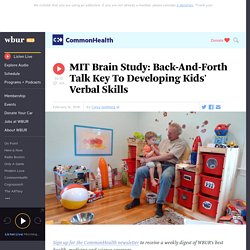
New MIT research finds that for children's brain development, parents don't just need to talk to their kids — it's important to talk with them, in back-and-forth exchanges. Story continues below Most Viewed Stories "What we found is, the more often parents engaged in back-and-forth conversation with their child, the stronger was the brain response in the front of the brain to language," said cognitive neuroscience professor John Gabrieli. How can parents and teachers best educate young children? What principles can both teachers and parents bring to the education of very young children?
Gillian Craig, who was part of the Learning Time with Shaun and Timmy writing team, explains. As teachers and parents, we follow certain principles in our roles. Being Multilingual: You speak with an accent. I don’t. Accents are things that only other people have. They are, by extension, things that you don’t want to have. Accents are, in short, shortcomings. This is why, if someone tells you that “you speak with no accent”, you can be sure of two things: that you have received words of praise indeed; and that you speak with the same accent as that person.
So the person is actually not only praising her own accent, she is also giving evidence that she has no idea she’s got one. We seldom hear people say “We speak with an accent” or “I speak with an accent” – unless we’re talking about our uses of foreign languages. Being Multilingual: The natives and the speakers. Let me start with the good news.
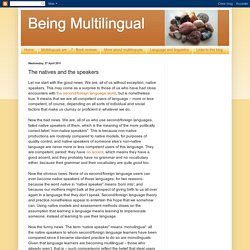
We are, all of us without exception, native speakers. This may come as a surprise to those of us who have had close encounters with the second/foreign language world, but is nonetheless true. Thanks for Signing Up for your Observations Guidelines. Ey besd. B480 Special Need Publication A4 V5 Final MR. Neurodiversity TfS online conference.
Teaching English to learners with Special Educational Needs (SENs) – Myths and realities. ‘I know I have children with special educational needs in my class, I want to help them and we are supposed to promote inclusion, but I really am not sure how to do this’ Vera, primary teacher from Spain ‘Some of the children in my class are really badly behaved, they can’t sit still, don’t finish their work and are always calling out.
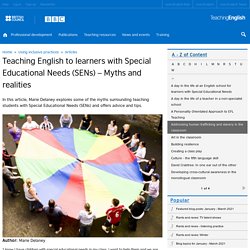
I think they might have a learning difficulty, but I don’t know what to do’ Kris, secondary teacher from Poland. Schemas in Children’s Play - N a t u r e P l a y. I Said I Want the Red Bowl! Responding to Toddlers' Irrational Behavior. Does my toddler have a short attention span because she won’t sit still for a story? A: It is perfectly normal for toddlers to not sit still very long—period.
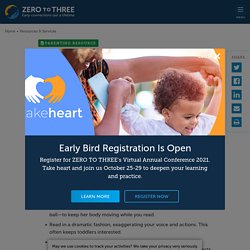
Most don’t like to stay in one place for long now that they can explore in so many new ways—by running, jumping, and climbing. So, an adult’s idea of snuggling on the couch to hear a story may not be the same idea a toddler has for story-time. You may only be able to read or talk about a few pages in a book at a time. Play. The Brain-Changing Power of Conversation. Carol Dweck: The power of believing that you can improve. The cognitive benefits of play: Effects on the learning brain. Scientists Say Child's Play Helps Build A Better Brain : NPR Ed. Symbolic play and language development.
Deconstructing Role Play – Provide the Resources, Step Back and Watch Children’s Learning Flourish. Why Movement is Essential in Early Childhood. The magic of child-directed play. Play to Learn: Discussion. Play to Learn. Why play-based learning? (free article) - Early Childhood Australia. Taking Playtime Seriously. Dr david whitebread the importance of play. Importance of play for babies & children. How young children learn English through play. Play. EFL Magazine - The Magazine for English Language Teachers.
Early childhood development – it’s not rocket science, it’s neuroscience! - Kathy Brodie Early Years Training. How do you speak 'Motherese'? The Woman Who Changed Her Brain: Barbara Arrowsmith-Young at TEDxToronto. What Parents Can Gain From Learning the Science of Talking to Kids. Does being bilingual make you smarter? A few more myths about speakers of multiple languages.
How Children Learn to Talk. Ideas, tips and resources for primary language teachers. Why does my toddler love repetition? - BabyCentre UK. Let's Talk. How can I help my child to start talking? (Video) - BabyCentre UK. Listen to Your Mother. Deb Roy: The birth of a word.